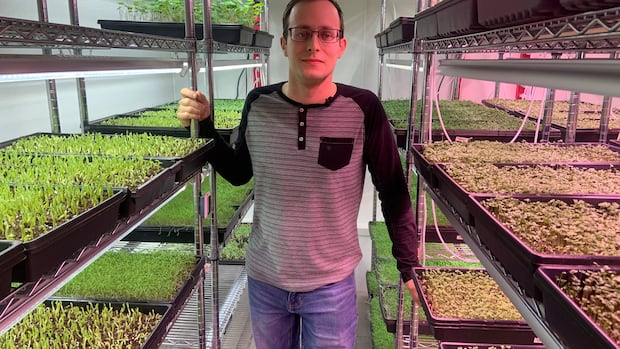Nova ScotiaA new relief fund organized by farm organizations will provide financial assistance to farmers who do not have crop insurance.Online fundraiser targets farmers who do not have crop insuranceFrances Willick · CBC News · Posted: Oct 13, 2025 5:00 AM EDT | Last Updated: 4 hours agoAdam Furlong is the owner of Outport Acres, a farm in Bloomfield, N.L. (Darrell Roberts/CBC)Two farm organizations have teamed up to offer financial support to farmers in Atlantic Canada who are struggling due to the effects of climate change.The Atlantic Canadian Organic Regional Network and the Bauta Family Initiative on Canadian Seed Security started an online fundraising campaign that offers immediate and direct aid to eligible producers.Bethany Koughan, the network’s program manager, says she’s heard from growers who have had significant losses or poor yields, who have had to till fall crops in due to drought, who couldn’t harvest blueberries due to the forest use ban, and who have had to buy feed due to poor pasture growth.“I was feeling frustrated. We were hearing kind of anecdotally from farmers across the country really, but especially in the Atlantic region, just how terribly tricky this season has been,” says Koughan.“So this was a way for us to … address it head on and do something quickly and directly.”Initial payments of $500The fund is open to non-subsistence farmers whose operation is their primary income stream, who are located in the Atlantic region, who are practising ecological agriculture, and who do not have crop insurance.Hosted on the GoFundMe website, the fund has raised about $4,500 so far.Eligible farmers will initially receive a cheque for $500 on a first-come, first-served basis, but depending on how much is raised and how many successful applicants there are, more support could follow.Pasture problemsRachael Robertson of Robertson’s Farm and Apothecary in Canaan, N.S., is among those who will receive funding.The farm produces herbs, teas, tonics and bitters as well as skin and hair products using botanicals and herbs grown on the Annapolis Valley farm. It is also home to Highland cattle and sells beef.Robertson said she was surprised to learn about the fund, especially as the application “didn’t need receipts, nor a business plan or [information about] ‘what went wrong.’”She said she usually doesn’t have to feed hay to her 17 cattle until November, when the animals stop eating grass. But this year, she had to switch to hay on Aug. 12 because the grass stopped growing due to the dry conditions.“At $70 per bale and feeding one bale of hay per day, we are in the red before the winter even brushes our fields with a dusting of snow,” she said.Intense heatAdam Furlong is a market gardener in Bloomfield, N.L. who has also been approved to receive funds.He said the intense heat had an impact on his crops, especially his potato plants, which partially died back, and peppers, some of which got burned by the hot temperatures.“I grew up here and I’ve never seen it this hot or this, you know, like we always kind of joke that Newfoundland is the land of rain, drizzle and fog because that’s usually all we ever get here,” Furlong said. “And we barely got any rain.”Furlong said the aid from the farmer relief fund is “just really nice to see.”“It definitely won’t pay all the bills or definitely won’t make up for the entire lost revenue. But I mean, you know, any amount helps.… It will lessen some of the burden of the bills that are sitting there having to be paid while the revenue is not keeping up with what was planned.”Koughan said while some producers may have access to government relief programs, those programs sometimes have “bureaucratic constraints” and are slow to deliver aid.“I got a really heartening email from a producer yesterday saying this response has been so much quicker than government and more direct. Even if it doesn’t cover all losses, it makes me feel seen and supported.”MORE TOP STORIESABOUT THE AUTHORFrances Willick is a journalist with CBC Nova Scotia. Please contact her with feedback, story ideas or tips at frances.willick@cbc.ca
New relief fund supports Atlantic farmers struggling with tough growing conditions











